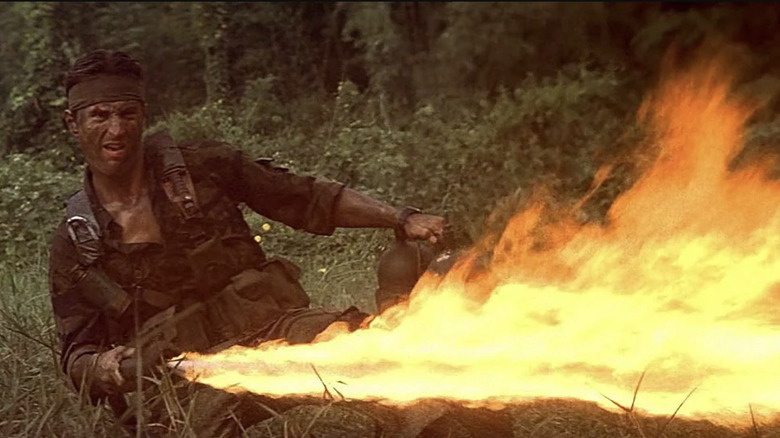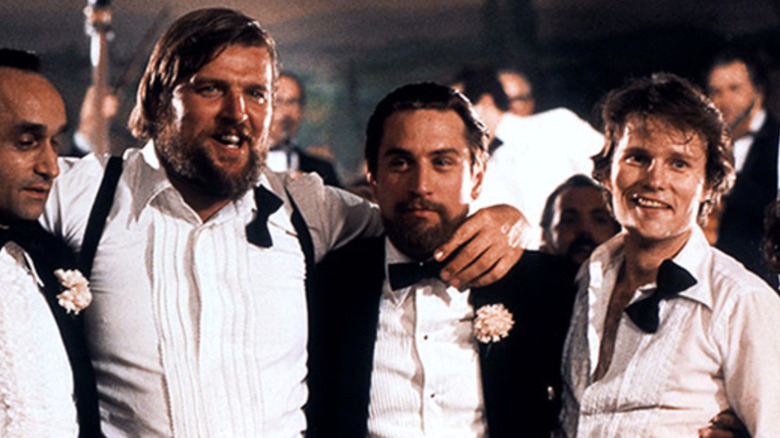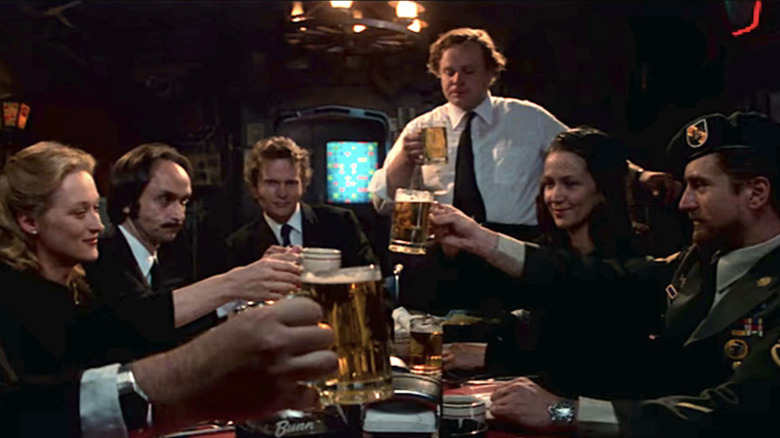The Robert De Niro War Movie That Shocked Studio Executives
Any student of cinema is also, by extension, a student of history. In other words, it's always informative to not just know what a film has to say, but at what point it was saying it. To anyone who's observed both American history and American cinema, the way that the Vietnam War was discussed and portrayed during the years just before, during, and after the conflict is fascinating. Most of us Millennials and younger have grown up during an era of people crying "too soon!" when it comes to openly political commentary in media, and indeed, in some cases it feels like films addressing national issues have taken their sweet time to emerge. For instance, despite being five years into the COVID-19 pandemic, and excluding the handful of films which have used the pandemic as a backdrop, it still feels like a largely unaddressed aspect of our modern life.
However, America used to be a place where artists felt more free to express their thoughts about a current topic in a major fashion, as several films about Vietnam prove. What's more, these movies weren't merely just allowed to be made, but some of them ended up becoming box office successes and Oscar winners, thus ensuring their cultural legacy. 1978's "The Deer Hunter," starring Robert De Niro and an Oscar-winning Christopher Walken, is one of these films. Released just three years after the United States' exit from the conflict, the film is one of the most uncompromising looks at the lingering effects of war in general, as well as the then-current effects being suffered by many contemporary folks.
Clearly, Michael Cimino's film was never intended as a crowd pleaser type of movie. Perhaps, had it been released earlier in the decade, "The Deer Hunter" may have had an easier time making it from script to screen. Yet, in a post-"Jaws" and "Star Wars" Hollywood, Cimino found himself having to contend with studio executives who were thoroughly shocked by the film, so much so that they nearly nitpicked it to death.
Executives initially refused to release The Deer Hunter due to its length
One of the ingenious aspects of "The Deer Hunter" is that it's a masterpiece spun out of an entirely different story, ironically making it one of two classic late-'70s Vietnam War movies to be adapted from other sources (the second being Francis Ford Coppola's "Apocalypse Now," an adaptation of Joseph Conrad's "Heart of Darkness"). The film began life as a script written by Louis A. Garfinkle and Quinn K. Redeker entitled "The Man Who Came to Play," about high-stakes gamblers who go to Vegas to play Russian roulette. As Peter Biskind's 2008 piece about "The Deer Hunter" and "Coming Home" at the 1979 Oscars in Vanity Fair details, producer Barry Spikings bought "The Man Who Came to Play" for EMI, and couldn't figure out how to make it until he met with Cimino. According to Spikings' recollection, the director succinctly solved that problem:
"You know why you're obsessed with [that script]? It's because the Russian roulette is a metaphor for what America was doing with its young people, sending them to a war in a foreign place, when there was no justification for it. I know something about Vietnam, and I've always wanted to do a movie about it. Are you up for it?"
Spikings' answer was a resounding yes, and Cimino's "The Deer Hunter" got underway. Yet the story grew, and so did the shooting schedule and budget, so much so that there was controversy surrounding the film before a cut was ever completed. Once a version of the finished movie existed, it screened for executives at Universal Pictures, who owned the rights to the film's domestic distribution. When Lew Wasserman (head of Universal's then-parent company MCA) and Sid Sheinberg saw the film, their reception of it was especially bad. According to Spikings:
"I think they were shocked...They really didn't like the movie. And they certainly didn't like it at three hours two minutes."
In addition to the controversy over the film's political content (more on that in a second), the executives subscribed to what became a popular notion, that Cimino's film was too lengthy, especially the first half, where the main characters attend a wedding of one of their buddies, just before many of them are sent to Vietnam. While myself and other aficionados of the film find this criticism erroneous, it was something that nearly prevented "The Deer Hunter" from being released at all. As Spikings recalled, Sheinberg gave him and Cimino an ultimatum:
"You've got to get one hour out of this movie—then we might think about releasing it."
The controversy over the ending of The Deer Hunter
Although the Universal execs hired one of their own editors, Verna Fields (who worked on "Jaws"), to try and cut "The Deer Hunter" down to their size, the final choice of which cut to release fell to the CEO of EMI, Bernard Delfont, who ended up choosing Cimino's cut. The executives didn't just have an issue with the movie's length, however. Much more concerning to them, according to Spikings, was its commentary on America:
"What really upset them was 'God Bless America.' Sheinberg thought it was anti-American. He was vehement. He said something like 'You're poking a stick in the eye of America.'"
The "God Bless America" moment is the ending of the film, where the broken yet surviving characters sing the hymn as they sit down to a meal. Indeed as Sheinberg said, it became a flashpoint scene for discourse about what the movie was trying to say about Vietnam and America in general, whether the song choice was intended as ironic, satiric, or genuinely patriotic. Fortunately, even though it's not clear whether Fields' cut removed or softened the ending somehow, the moment remained intact thanks to Delfont preferring Cimino's cut of the movie.
Cimino remains one of the most divisive figures in American film, and while "The Deer Hunter" is generally regarded as his masterpiece, its merits and flaws are still debated to this day. Some of those flaws aside (including playing fast and loose with its politics), one of the strengths of the film is how it gives the viewer the opportunity to draw their own conclusions while still having a point of view. The Vietnam War was far too fresh in American's minds in 1978, so much so that of course a movie as bold as "The Deer Hunter" would be shocking. In 2025, it's far easier to comprehend an ending (and a film) that has affection for America while pointing a bitter, condemning finger at it. Being able to simultaneously love and criticize our country is one of the greatest freedoms we Americans get to enjoy — for now.


